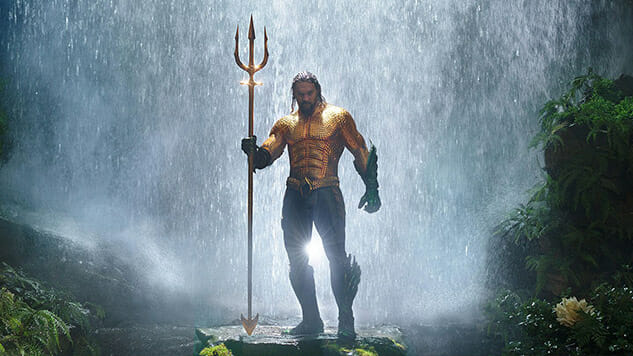Aquaman

There’s probably no better time than now for an Aquaman movie, this Aquaman movie, to drop like a much-too-moist dollop on the heads of the overstimulated theater-goers of the world. Optimistic about the fate of our doomed global ecosystem—there is time, Aquaman claims, for us to take responsibility for this world we’re ruining—but also cowardly about the direness of our doomed global ecosystem—those billionaire monsters killing all of us, Aquaman (Jason Momoa) claims, are sure some real “jerks,” but still, the world above the surface is great!—James Wan’s addition to the DCEU is by far its lightest, and so most likely best, bit of canon yet. Paying environmental catastrophe lip service is an expected thematic conceit for movies in 2018, but no one (hypothetically) wants to pay to sit in a damp two hours and 20 minutes of guilt when every film in this Universe to come before was either suffocatingly grim or unfairly tasked with shouldering the entire weight of Hollywood’s misogyny. All Wan had to do was deliver a blisteringly colorful spectacle. Aquaman is dumb and loud and really dumb and too long and dumb but also wonderfully creative and shameless; it’s both the superhero film we need, and the one we deserve.
The plot, as is the case in almost every DCEU entry, is as bloated as it is messy and predictable, a whale carcass washed up on shore sliced in half by Atlantean plasma lasers during a Two Towers-league battle with an army of crab people. We learn through painful voiceover that debonair drunk Arthur Curry (Momoa) is the offspring of a Maine lighthouse keeper (Temuera Morrison) and the Queen of Atlantis, Atlanna (Nicole Kidman, dreadful), who washed ashore during a storm in 1985. The two fall in love because the lighthouse keeper shows her simple human kindness, and together they get down to domesticating, but not long after, Atlantean soldiers come to take Atlanna back to Atlantis in shackles, a traitor for her commingling with oxygen-breathing humans.
Arthur grows up steadily learning about his powers as a half-royal-Atlantean, able to communicate with marine life, control the tides, swim at impossible speeds, deflect bullets (?) and generally be really strong, his pubescent training entrusted to Atlanna’s vizier, Vulko (Willem Dafoe, so on the same page as this movie), to one day take his rightful place as King. Of course, even super-advanced underwater societies are filled with bigots, so Arthur’s cast out by his Lovecraftian full-breed brethren—including Orm (Patrick Wilson), his half-brother and future ruler—while his mom’s supposedly executed for her crimes against Atlantean purity. Pissed and capable of drinking a lot of alcohol, Arthur spends his nights getting wasted with his dad and his days fighting pirates on the Atlantic, where he happens to meet scientifically-gifted mercenary David Kane (Yahya Abdul-Mateen II) and a tale of paternal vengeance ensues. This is pretty much only the first 25 minutes of Aquaman.
Inevitably, Arthur’s past comes to find him in the form of oddly over-sexualized Atlantean Princess Mera (Amber Heard), who wears high heels underwater, calling on Arthur to return to Atlantis and claim his rightful place as King from the bellicose hands of Orm, who, with the help of King Nereus (Dolph Lundgren, certifiable good actor now) of the Xebel underwater tribe (and Mera’s dad), wants to unite all the kingdoms of the “Seven Seas” to become the legendary Ocean Master and wage war on humans. Because humans are destroying the planet. Or something. Obviously, Orm is power hungry and petulant, but Wilson plays him not as a caricature like Kidman does her supernatural being, but as a magnanimous, well-loved ruler whose many grievances are, despite his malevolent means, pretty much warranted. Only Dafoe seems to get what’s going on as well as Wilson, the two injecting pathos and believable moral conflict into an otherwise bland, straightforward narrative culled from every recent blockbuster, like Black Panther and Ant-Man and the Wasp, peppered with winking nods to other sea-based standards such as Jaws.